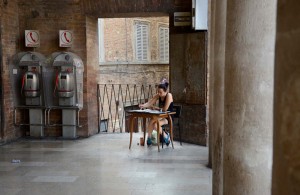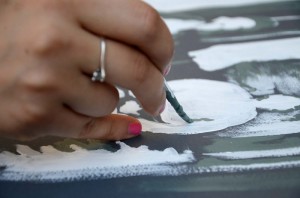A 26-year-old Albanian art student, like many other immigrants here, is determined to remain free and away from her native land.
URBINO, Italy – For 50 years, under the rule of Enver Hoxha, every Albanian was cut off from the world.
Hoxha died in 1985 and Albania slowly transitioned to a democracy over the next five years. Although today it is considered a democracy, it is not even a candidate for joining the European Union. Most of its citizens are still on the outside looking in on the rest of Europe like so many others to the south and east of the continent.
Genta Sulaj was born in 1985, in the city of Vlore, Albania. At 26, she is an aspiring artist studying at the University of Urbino. If everything goes according to plan, Sulaj will graduate from the university in September. After that, she has only three months left on her student visa to figure out her life’s direction.
She is determined to remain free and away from Albania.
It’s hard for citizens of non-European Union nations to find work in the 27 nations that are members. This will make it hard for Sulaj to find a job or maintain a visa in Italy.
To obtain a visa in Italy you must be able to prove that you have a sustainable income that supports you and a family, according to the Italian Ministry of Foreign Affairs. That’s hard for an artist to prove.
In a city famous for its Renaissance painters, Sulaj follows her own path as an artist. “In Italy, I am much freer,” Sulaj says. “I can be an artist here.”
Her charcoal covered fingers flow elegantly across a white canvas. Little by little the features of a face can be seen, shaded in black. Sulaj says her emotions dictate her portraits, a hard task for someone who has so many scars from her past.
Adding to Sulaj’s struggle, Italy has recently passed new laws to help stop the influx of North African immigrants. The new law makes it a crime to be an illegal immigrant punishable by up to 10,000 euro ($12,500) and up to four years in prison if the immigrant violates expulsion orders, according to the Humans Rights Brief.
The idea behind the severity of the new law is deterrence.
For example, before the Arab Spring in 2011 and the fall of the Libyan government, Italy worked with Libya to help catch boats filled with illegal immigrants before they reached the shores of Italy. If caught, most of the immigrants were put on Libyan vessels and sent back.
In recent years Italy has seen more and more immigrants cross its borders, especially since the start of the Arab Spring. European media have noted that Italy, once a mass exporter of emigrants, has become in recent decades a destination for immigrants.
With three months left on her visa after graduating from the university in the fall, Sulaj is faced with a tough choice. She can try to find a job in Italy and obtain a worker’s visa, return home to Albania, or she can stay in Italy illegally, something she is not willing to do.
Sulaj can’t imagine going back to Albania, mainly due to the cultural customs that would be waiting for her if she were to return for a long period of time.
“If I return [to Albania], I will have to get married, kids, family, no time for anything else,” she says. “I can’t be an artist if I return because of the customs that are expected of me.”
[pullquote]If I return (to Albania), I will have to get married, kids, family, no time for anything else. I can’t be an artist if I return because of the customs that are expected of me.[/pullquote]
“It is a very beautiful place, where I come from, but it is too corrupt,” she says.
Before coming to Italy, Sulaj wanted to study in Tirana, the capital of Albania. However, before she could even start, a professor approached her and told her she had to pay 2000 euro ($2,500) to pass the exams. Otherwise she would fail.
Not willing to pay the money to automatically pass the exams, Sulaj tried a long shot and obtained a three-month student visa to enter a scholarship competition at the University of Urbino. The competition had three parts: Italian language, art history and drawing. Sulaj placed second in the competition and earned a scholarship to attend the university.
This allowed her to obtain a one-year student visa that she must renew every year.
Now in her eighth year in Italy and at the University of Urbino, her time is running out. She has only a few months left at the university, and afterwards she is “free” to find legal status in a short time or be expelled from the euro zone.
“I don’t know where I will go after university, maybe Venice, Firenze, or Paris, anywhere but Albania” she says.
If Albania were a member nation of the EU it would be easy, since citizens of any member nation can freely cross borders and work in any of the other member nations.
This makes it hard for people who are on the outside looking in to obtain worker visas and find jobs in EU countries.
Even though Sulaj does not want to return to Albania after graduating, she still gets most of her inspiration from her home town of Vlore and Albanian culture.
“I want to keep my culture alive through my artwork,” she says.
For her final project she must create a series of 15 paintings that tell a story. Sulaj chose to depict one of Albanian’s laws that dates back centuries.
“In Albania, if you kill someone, the other family can get revenge. They have one month, and can only kill the man in the family, no women.”
According to European sources, this practice is called Gjakmarrja, which in English means blood feud. The practice dates back centuries to tribal law, where families had the obligation to avenge the honor of a previous murder by killing a member of the same family as the murder.
Many families flee the country or hide out in their house for the month, since the law states that the house is a safe haven.
Sulaj is in a similar limbo, creating art to express it. “I can never go back, but I cannot stay either. I will just have to see where I end up later in life.”
Multimedia

